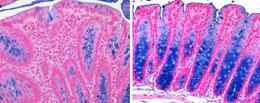 Could genetically-engineered bacteria help to banish gastrointestinal woes?Punchstock
Could genetically-engineered bacteria help to banish gastrointestinal woes?PunchstockPosted on 08/22/2009 1:41:45 PM PDT by neverdem
An engineered bacterium can deliver a therapeutic protein straight to the gut when fed with xylan.
 Could genetically-engineered bacteria help to banish gastrointestinal woes?Punchstock
Could genetically-engineered bacteria help to banish gastrointestinal woes?PunchstockA gut-dwelling bacterium has been genetically engineered to deliver a dose of therapeutic protein on demand.
Protein production in the engineered bacterium is switched on only when its host eats the complex sugar xylan. Tests on mice that had colonies of the bacteria in their guts showed that the expressed protein can successfully treat an inflammatory bowel disease called colitis.
The research, to be published in the journal Gut1, has potential as an alternative method for delivering drugs to the colon. Drugs taken orally are often broken down into inactive forms before they reach their target in the digestive system.
In 2000, Lothar Steidler, then at the University of Ghent, Belgium, and his colleagues showed that Lactococcus lactis bacteria that were engineered to secrete mouse interleukin-10 anti-inflammatory protein were effective at treating colitis in mice2. But those bacteria generated the protein non-stop, without the ability to regulate how much was produced.
Now, microbiologist Simon Carding of the Institute of Food Research in Norwich, UK, and his team have engineered the gut bacterium Bacteroides ovatus to carry a gene that encodes the therapeutic protein keratinocyte growth factor-2, which has a crucial role in maintaining and repairing the intestinal lining. Crucially, the protein is expressed only when the bacteria are fed with xylan.
The team found that the protein-expressing bacteria reduced rectal bleeding, accelerated healing of the gut lining and reduced gut inflammation in the mice. The protein could also prevent development of the disease in the first place. "There were no side effects, none at all. We were amazed how well it worked given the small amount of bacteria administered," says Carding.
 Sections of colon from mice with untreated colitis (left), and after treatment with bacteria and xylan (right). The blue stain identifies cells producing mucin, involved in repairing the gut barrier.S. Carding
Sections of colon from mice with untreated colitis (left), and after treatment with bacteria and xylan (right). The blue stain identifies cells producing mucin, involved in repairing the gut barrier.S. CardingBecause B. ovatus is a natural inhabitant of the mucus within the colon, the team thinks that the protein is being delivered specifically to the damaged cells that line the gut. "A major goal of drug treatment for any disease is to target it to the site of disease activity and to be able to control its levels in the body," Carding explains.
"The system we have developed is a means of delivering proteins to the colon, and it could be used to deliver a variety of proteins for a variety of purposes, including vaccine antigens," adds Carding. His team is currently testing about a dozen bacterial strains that express different proteins, including one that limits tumour growth by restricting blood-vessel formation.
Gérard Eberl, a microbiologist from the Pasteur Institute in Paris, says that "it would probably be very easy to make this work in humans as well, since human and mouse intestinal bacterial communities are very similar".
Francisco Guarner, a gut researcher at the Vall d'Hebron University Hospital in Barcelona, Spain, is more cautious. Although there has been a lot of interest in the idea since Steidler's research was published in 2000, the field has not developed as quickly as expected, he says.
Promising studies have shown that L. lactis that are engineered to deliver therapeutic drugs could be safe in humans. But Guarner says that it may be difficult to translate gut research in mice into a human clinical setting — not least because of unknown effects from the zoo of other bacteria fighting for space in our guts.
micro ping
My local supermarket has big leaves of aloe for just 99 cents.
Now that's medical value!
No doubt the sugars in aloe work the same.
Maybe that's what gave them the idea.
My son has ulcerative colitis. One can only hope.
Maybe that's what gave them the idea.
"Now, microbiologist Simon Carding of the Institute of Food Research in Norwich, UK, and his team have engineered the gut bacterium Bacteroides ovatus to carry a gene that encodes the therapeutic protein keratinocyte growth factor-2, which has a crucial role in maintaining and repairing the intestinal lining. Crucially, the protein is expressed only when the bacteria are fed with xylan."
My guess is that the aloe works directly as an anti-inflammatory, IMHO.
Saw a Dr. in St.Louis that treats Crohn's and he could not rule out a Crohn's flareup, but will do a complete exam later.
I'll forward this article on to him and his parents.
Thanks for posting.
I have ulcerative colitis also. Found out through trial and error that rice is my trigger -avoid that and eat activated yogurt and suchlike regular and no real problems.
Have you tried eating a couples oz.(about a tablespoon size) of fresh aloe flesh before going to bed( or on an empty stomach)?
That's been an amazing cure for me and several people I know.
Ironically, the ones who poo poo it or say it doesn't work are the one's who haven't tried it.
The German people have a word for that, but I don't know how to spell it.
Disclaimer: Opinions posted on Free Republic are those of the individual posters and do not necessarily represent the opinion of Free Republic or its management. All materials posted herein are protected by copyright law and the exemption for fair use of copyrighted works.